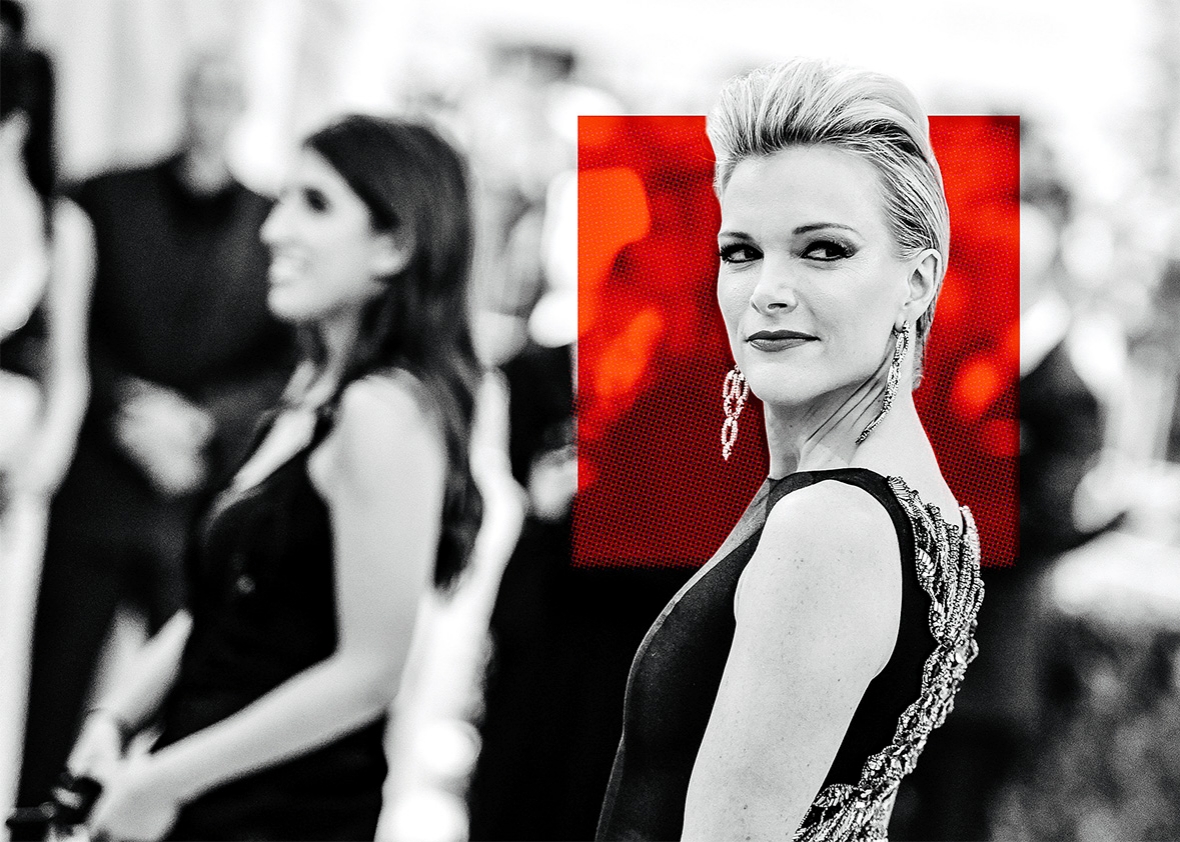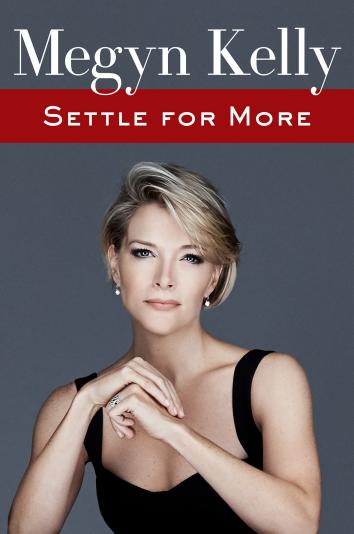
Slate is an Amazon affiliate and may receive a commission from purchases you make through our links.
“I Built My Own Power”
Megyn Kelly’s memoir is an unsettling window into the forces behind her meteoric rise.

Photo illustration by Slate. Photo by Mike Coppola/Getty Images Entertainment.
There’s a revealing passage more than a third of the way through Megyn Kelly’s new memoir, Settle for More, after Kelly, then a local television reporter, goes to meet Roger Ailes for the first time. Ailes, who was pushed out as head of Fox News Channel this year after numerous accusations of sexual misconduct, “asked me how the daughter of a nurse and a college professor understood anything other than left-wing dogma.” Kelly’s answer:
I told him the truth: I was raised in a Democrat [sic] household but was apolitical. I had been for my entire life. We just were not a political family, ever. As I wrote in my journal in 1988: ‘Am I a Republican or a Democrat? I seriously don’t know.’
I also said to Roger that nine years of law had exposed me to other views and taught me how to argue and understand both sides. Contrary to popular belief, he wasn’t looking for a Republican reporter—he just wanted someone who was open-minded.
Contrary to popular belief, the person who wrote these paragraphs is neither a “great journalist” (in the words of New York Times executive editor Dean Baquet), nor someone who “transcends politics” (as a fawning Vanity Fair cover story last year proclaimed). But she is an extremely compelling and even mysterious personality as this excerpt, perhaps unintentionally, displays. For starters, there is Kelly’s feigned naiveté about her actual ideology and agenda. (Perhaps it wasn’t always feigned—the journal entry, which would have been written around the time Kelly was 18, highlights what Christopher Hitchens wrote was the difference between an open mind and an empty mind: the latter “will not stay vacant for long but will be swiftly filled up—with platitude.”) Kelly’s Fox News show is, it’s true, not strictly partisan; she can be nice to Democrats, tough on Republicans, and surprisingly passionate about liberal causes such as paid family leave. But The Kelly File is quite clearly ideological and very rarely “open-minded.” It is guilty of the same race-baiting and fearmongering that the rest of the network practiced throughout the election, and indeed over the past two decades—a strategy that allowed Ailes to become the television legend, and legendary creep, he is now universally recognized to be. (OK, not quite universally: Donald Trump counts him as a friend and adviser.)
Another lesson of the excerpt from her book is that Kelly still buys—or at least sells—the nonsensical notion that Ailes, in seeking an “open-minded” reporter, was committed to genuinely honest journalism, the Fox News slogans for which (“Fair and balanced,” “We report. You decide”) have become punchlines. In a memoir that forthrightly details the harassment Kelly faced at Ailes’ hands, you might expect to find greater honesty about Fox News itself, and the political and ideological project that Kelly is in fact an integral part of. But no: Instead, Kelly reveals herself to be either a lot less canny than she seems or even cannier than she wants to let on. My money is on the latter.
Kelly’s opacity is fascinating, coming as it does from someone whose presentation is so firm and apparently grounded, so set in her opinions and so self-consciously self-confident. This combination of qualities is certainly what allowed her to gain such wide-ranging respect and admiration among a press corps generally (and rightly) suspicious and dismissive of Fox News. Kelly, unlike Fox’s other primetime hosts, Bill O’Reilly and Sean Hannity, has done her best to cloud her real agenda; no one at the conservative network in its two decades of existence has managed to “break out” in similar fashion. But she still comes across in Settle for More as a fundamentally dishonest person because she is misleading about what she actually does every night of her show, with its obsessive focus on black people committing crimes and the New Black Panther Party’s threat to our way of life. Kelly’s ability to seem reasonable and dogged, while simultaneously feeding red meat to her white base, is the reason for her outsize success.
The book itself is often as wholesome as apple pie, and as unwise to consume in large servings. Raised outside of Albany, New York, Kelly drearily traces her early years (“Mom was—and still is—a force of nature”); soon she is off to college and then law school, the latter of which “was challenging, in a great way.” Things pick up considerably, though, as Kelly’s career starts in earnest. She is admirably upfront, for example, about her ability to manage men. “My legal training gave me several skills, but knowing how to handle men in positions of authority was easily one of the most valuable,” she writes in the first of several passages on this theme.
Thanks to her dedication, Kelly managed to land a gig in local television news. A year later, she had her fateful meeting with Ailes, and her career at Fox began. The Fox sections of the book—she started there in 2004—are the most compelling, partially because Kelly’s rise at the network was so impressive, and partially because she describes people such as Ailes and Brit Hume in ways that are often vivid. (After rumors of an affair between Kelly and Hume spread, “Brit was strutting around the office, proud as a peacock!”)
In the age of Trump and Cosby, Kelly’s run-ins with Ailes were comparably mild, but they are still disturbing and grotesque, and the passages about them are resonant thanks to the acutely believable portrait she paints of Ailes’ character and personality. “I would be called into Roger’s office,” she writes, and “he would shut the door, and over the next hour or two, he would engage in a kind of cat-and-mouse game with me—veering between obviously inappropriate sexually charged comments (e.g. about the ‘very sexy bras’ I must have and how he’d like to see me in them) and legitimate professional advice.” Kelly not only managed to avoid him, but also told investigators and the Murdoch family about his behavior, and offered support for colleagues who also claimed to have been mistreated. Kelly’s steadfastness was admirable, and so is the honest avowal she makes at the end of her chapter about the ordeal: “I built my own power. And when the allegations about Ailes hit, I used it. Perhaps there is some poetic justice in that.”
But the problem of what Kelly “uses” that power for remains. Too often, it has been to express opinions such as this one that she shared with viewers in 2013:
For all you kids watching at home, Santa just is white. But this person is maybe just arguing that we should also have a black Santa. But, you know, Santa is what he is. … Jesus was a white man too. … I mean, he was an historical figure, that was a verifiable fact, as is Santa. … I just want the kids watching to know that.
The creepy thing about moments like this is that Kelly exudes the same certainty and passion in expressing such opinions that she does when dressing down Mike Huckabee or Karl Rove. Although Kelly’s issues may not be the same as Hannity’s or O’Reilly’s (or the U.S. Chamber of Commerce’s), she nonetheless has an agenda that is easily integrated into her milieu. Kelly attempts to differentiate herself from other offenders at her network later in the book when she notes that she has the “most successful news show in all of cable (O’Reilly’s is an opinion program).” One of the most memorable Kelly segments occurred after Michelle Obama gave a speech that mentioned America’s history of racism. Kelly listened politely while her right-wing guest talked about the “illusion of systemic discrimination” and piped up to add, “We are seeing, more and more, a culture of victimization. … I call it cupcake nation. That’s what we are turning into.” This is the real Megyn Kelly experience.
The Trump sections of the book are the most disturbing, and in them Kelly’s tough-as-nails truth-telling side comes out, or at least it keeps threatening to, before she reverts to form. She details Trump’s attempts to influence her, first threatening to “unleash” his Twitter account on her (which he did anyway) and then somehow discovering that she was going to challenge him at the beginning of the Republican debate. Kelly even raises the possibility that she was poisoned, presumably by someone connected to Trump. Later, his attacks on her were followed by death threats from the then-candidate’s deranged fans.
It’s truly riveting stuff. But Kelly also claims that Trump kept trying to woo her with gifts; why did she wait until now to report this? She also claims that Trump offered gifts to many other reporters, but she didn’t mention this until after the election, either. I understand why she wanted to save it all for the book, but it’s odd that all these tales—the Fox News leaks of debate questions to Trump, perhaps even a possible poisoning—are just coming out now. Moreover, the book seems to want us to forget that once she and Trump at least temporarily set aside their feud, she was given an hour to interview him and turned in a pathetic performance on the Fox broadcast network, full of soft questions and hot air.
That hour was a sign that amidst rumors of a toned-down Fox News in the wake of Ailes’ departure, Kelly is unlikely to lead a charge against the new administration at the network even if she signs another contract there. Moreover, for all the talk about a feud between Trump and Fox, well, don’t count on it. Ailes may have been a television genius, but the major lesson he imparted—to know your audience—is a simple one that the Murdoch family is unlikely to discard. As for Ailes’ role in demeaning American politics and media over several generations, Kelly is conspicuously silent.
There was a time several months ago when the America of Donald Trump and Roger Ailes seemed to be drifting away, with the Republican Party in chaos as both men battled allegations of sexual misconduct and Hillary Clinton comfortably ahead in the polls. That America was a place where women could be treated however old white men desired, a place where nasty rhetoric and race-baiting were condoned. For all the disgust that she claims to feel for the misogyny and male entitlement of this soon-once-again-regnant America, and for all the personal harm it caused her, our bleak future is one in which Megyn Kelly is likely to find herself right at home.
--
Read the rest of the pieces in the Slate Book Review.
Settle for More
Check out this great listen on Audible.com. Anchor of the number-one news show on cable, The Kelly File, Fox News Channel's Megyn Kelly writes her much anticipated book, a revealing and surprising memoir detailing her rise as one of the most respected journalists working today. From the values an...
